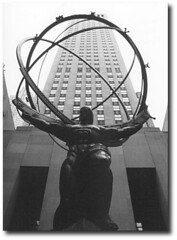Happy for the Work
This is very interesting... and confirms my theory that a "life of leisure" is nothing but a fantasy and in most cases leads to disaster (think Paris Hilton).
"It is vacation season once again, giving occasion for the usual homilies about how Europeans are having a much better and healthier time of it than we are when it comes to work. You've heard it a thousand times: Americans "live to work," while Europeans "work to live."
By almost every measure, Europeans do work less and relax more than Americans. According to data from the Organization for Economic Co-operation and Development, Americans work 25% more hours each year than the Norwegians or the Dutch. The average retirement age for European men is 60.5, and it's even lower for European women. Our vacations are pathetically short by comparison: The average U.S. worker takes 16 days of vacation each year, less than half that typically taken by the Germans (35 days), the French (37 days) or the Italians (42 days).
Why these differences? There are two standard explanations, neither of which casts Americans in a particularly good light. First, we are emotionally stunted. According to Time magazine, "In the puritanical version of Christianity that has always appealed to Americans, religion comes packaged with the stern message that hard work is good for the soul. Modern Europe has avoided so melancholy a lesson."
Obviously, there is a point beyond which work is excessive and lowers life quality. But within reasonable bounds, if happiness is our goal, the American formula of hard work appears to function pretty well.
Second, we are under the yoke of hard-bitten capitalism. London's Daily Telegraph reports that the heavy U.S. work effort does not result from a special affinity Americans have for work; rather, it is because we are "terrified of losing [our] jobs" in a labor environment in which workers have few of the protections Europeans enjoy.
According to either explanation of the high American work effort, we would be a lot happier if we could somehow throw off our chains--both emotionally and legally--and demand shorter work weeks, longer vacations and bulletproof tenure until our early retirements. A tidy hypothesis, to be sure--until we look at the facts.
The truth is that most Americans don't feel particularly shackled. To begin with, an amazingly high percentage of us like our jobs. Among adults who worked 10 hours a week or more in 2002, the General Social Survey (GSS) found that 89% said they were very satisfied or somewhat satisfied with their jobs. Only 11% said they were not too satisfied or not at all satisfied.
Of course, some would argue this statistic must be hiding big differences between people with "good" jobs and those with "bad" jobs. Presidential candidate John Edwards, in an argument fit for the French, tells us that we are two nations: "One America that does the work, another America that reaps the reward."
No doubt there is great job dissatisfaction among people with low incomes and little education--the folks working in factories and on farms; the people who sell you socks and serve you lunch--right? Wrong. There is no difference at all between those with above- and below-average incomes: nine in 10 are satisfied, as are people without college degrees. 87% of people who call themselves "working class" are satisfied.
But even if we are satisfied with our jobs, might we still be happier at the beach? Imagine asking people something like this: "If you were to get enough money to live as comfortably as you would like for the rest of your life, would you continue to work or would you stop working?" Certainly a high percentage would answer in the affirmative? Wrong again: In 2002, the GSS found that number to be less than a third of all workers. And once again, there is no difference between those at different levels of income or education. 69% of working class folks say they would keep working even if they didn't have to.
For most Americans, work is a rock-solid source of life happiness. Happy people work more hours each week than unhappy people, and work more in their free time as well. Even more tellingly, people with more hours per day to relax outside their jobs are not any happier than those who have less non-work time. In short, the idea that our heavy workloads are lowering our happiness is twaddle.
Obviously, there is a point beyond which work is excessive and lowers life quality. But within reasonable bounds, if happiness is our goal, the American formula of hard work appears to function pretty well.
This may be one reason why Americans tend to score better than Europeans on most happiness surveys. For example, according to the 2002 International Social Survey Programme across 35 countries, 56% of Americans are "completely happy" or "very happy" with their lives, versus 44% of Danes (often cited in surveys as the happiest Europeans), 35% of the French and 31% of Germans. Those sweet five-week vacations and 35-hour workweeks don't seem to be stimulating all that much félicité. A good old-fashioned 50-hour week might be a better option.
The bottom line is that this year, I will not flinch at any mocking European glance as I write emails from the beach--or skip the beach entirely. For I am happy."

No comments:
Post a Comment